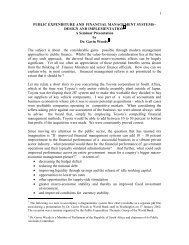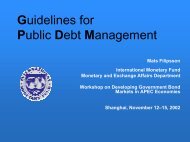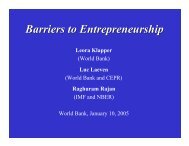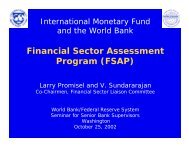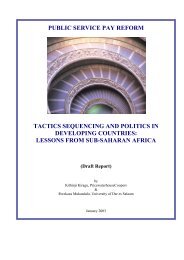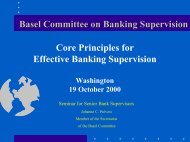CORRUPTION ASSESSMENT: MOZAMBIQUE - World Bank
CORRUPTION ASSESSMENT: MOZAMBIQUE - World Bank
CORRUPTION ASSESSMENT: MOZAMBIQUE - World Bank
You also want an ePaper? Increase the reach of your titles
YUMPU automatically turns print PDFs into web optimized ePapers that Google loves.
Robert Klitgaard’s formulation of corruption – that it is a result of monopoly power, plusofficial discretion, minus accountability – is a helpful rubric for understanding corruptionin Mozambique, where:• power is highly concentrated in one political party and few groups in society arereasonably capable of contesting for power;• the discretion of government officials is unchecked and the rule of law isminimally respected; and• there is little if any accountability of officials to citizens (Klitgaard, Maclean-Abaroa and Parris, 2000).While laws and regulations exist on paper that provide a framework for good governance,few control mechanisms are established or operate in reality to ensure that thisframework functions honestly, transparently and in accordance with the public good.These dynamics are at work at both the elite and administrative levels. However, it is thegrand corruption at the elite level that sets the tone for and limits the ability of even thosebrave individuals who want to make a difference to do so.A continuing concern regarding corruption in Mozambique are the allegations of possiblecollusion or even active involvement of individuals within government or the ruling partyin criminal activity, including drug trafficking, money laundering, and theft of publicfunds. High-profile murders appear to be directly linked to silencing efforts to exposethis activity. This atmosphere of lawlessness has not improved in recent years and furtherexacerbates diminished governance capacity.Capacity and accountability will be particularly important in the near future, asMozambique develops and expands its extractive and metallurgical industries.Aluminum, power generation, coal and natural gas have all recently become major newsources of much-needed revenue for the country. Already, they represent more than 75percent of Mozambique’s gross domestic exports. These cash cows represent extensivenew opportunities for corruption and raise the stakes for control of the state, especially ifthey are controlled by a few companies or ministries. As these industries are expandedand new ones developed, it will be critical to ensure that their operations and revenue aretransparent and accounted for and that the proceeds benefit all the citizens ofMozambique.The abuse of public office for private gain in Mozambique is abetted by several factors inthe institutional and political environment, including:• The dominance by a single party of all branches of government, which underminesthe concept and practice of checks and balances.• A lack of direct accountability to citizens and weak control mechanisms to detectabuses.• Impunity for those with wealth and connections to the politically powerful.• Discretionary application of the law to favor politically-connected individuals.FINAL REPORT 2


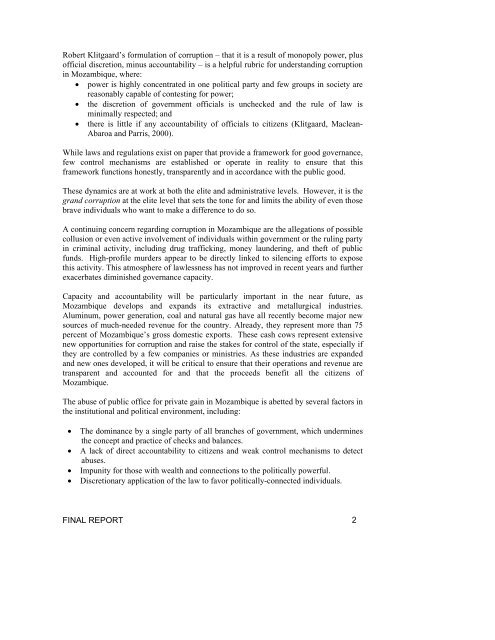
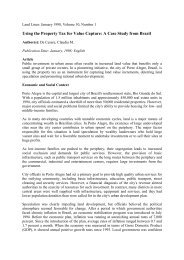

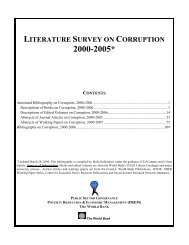
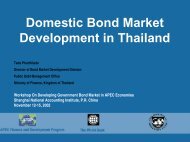
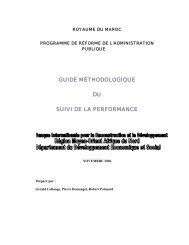
![Budget Execution: Overview [PDF 453K]; Bill Dorotinsky - World Bank](https://img.yumpu.com/47844909/1/190x143/budget-execution-overview-pdf-453k-bill-dorotinsky-world-bank.jpg?quality=85)
